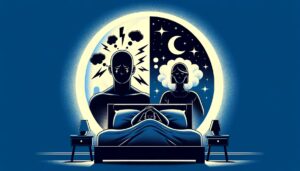Understanding Insomnia
Many of us toss and turn at night, struggling to unplug from the stresses of the day. But when does occasional sleeplessness turn into insomnia? Insomnia, a common sleep disorder, can manifest in various forms—difficulty falling asleep, waking too early, frequent awakenings, or unrefreshing sleep. The root causes of insomnia are as varied as its symptoms, ranging from stress and anxiety to medical conditions and lifestyle factors.
There's a vital distinction to be made between episodic sleep disturbances—which occur temporarily due to life circumstances—and chronic insomnia, which persists for at least three nights a week over a period of three months or longer. The impact of sustained sleep loss goes beyond fatigue, potentially affecting cardiovascular health, mental wellbeing, and overall quality of life.
Top Natural Remedies for Insomnia
Herbal Remedies
Let’s delve into nature’s medicine cabinet to explore how certain herbs help calm the mind and prepare the body for a rejuvenative sleep:
- Valerian Root: Known for its sedative qualities, this herb can reduce the time it takes to fall asleep and improve sleep quality.
- Lavender: The soothing aroma of lavender not only relaxes the mind but can also enhance sleep quality, especially in those suffering from sleep disturbances.
- Chamomile: This gentle tea is beloved for its calming effects, making it a great bedtime ritual for those looking to unwind.
- Lemon Balm: Often used in combination with other calming herbs, lemon balm can help relieve anxiety and insomnia.
Diet and Supplements
Proper nutrition plays a key role in how well you sleep. Here are some natural dietary adjustments and supplements that could make a significant difference:
- Foods Rich in Magnesium and Potassium: Bananas, almonds, and spinach can help relax muscles and calm the nervous system, promoting better sleep.
- Complex Carbs: Whole grains like oatmeal or whole-wheat bread help boost serotonin levels in the brain, which aids in sleep regulation.
The Role of Melatonin
Melatonin, a hormone primarily released by the pineal gland, orchestrates the sleep-wake cycle. Here's how you can use melatonin supplements effectively:
- Timing is Everything: For those with delayed sleep phase syndrome, taking melatonin several hours before bedtime can help adjust their internal clocks.
- Light Exposure: Minimize exposure to blue light from screens before bedtime as it can suppress natural melatonin production.
Lifestyle Changes for Better Sleep
Sleep Hygiene Tips
Creating a conducive sleep environment and a calming pre-sleep routine can dramatically improve your sleep quality. Here are some tips to enhance your sleep hygiene:
- Stay on Schedule: Consistency is key. Try to go to bed and wake up at the same time every day.
- Optimal Environment: Keep your bedroom dark, quiet, and cool. Invest in a good quality mattress and pillows.
- Wind Down Rituals: Engage in a relaxing activity before bed, such as reading or taking a warm bath.
Exercise and Diet
The connection between your daytime activities and night-time rest cannot be overstated. Regular physical activity can help you fall asleep faster and enjoy deeper sleep. Timing matters, though; exercising too close to bedtime may leave you too energized to sleep.
A balanced diet also supports better sleep. Limit caffeine and alcohol intake as they can interfere with sleep onset and affect sleep architecture.
Mindfulness and Relaxation Techniques
Breathing Exercises
Simple techniques like deep breathing can be incredibly effective. Try the 4-7-8 method: inhale for four seconds, hold your breath for seven seconds, and exhale slowly for eight seconds. This method can help reduce anxiety and prepare your body for sleep.
Meditation and Yoga
Engaging in mindfulness practices such as meditation and yoga can significantly improve sleep. These practices not only calm the mind but also prepare the body for sleep by relieving physical tension. Regular practice is key to reaping the benefits, so consider incorporating these into your nightly routine.
As we progress through these natural remedies and lifestyle adjustments, remember the goal is to create a peaceful retreat that welcomes sleep. Consider these solutions as a holistic way to improve not only your nights but also your overall health and wellbeing.
What Research Says
Research plays a pivotal role in validating the efficacy of natural remedies for insomnia. Various studies have explored how non-pharmaceutical interventions can help ease this prevalent sleep disorder. For instance, chamomile, famed for its relaxing properties, and valerian root, a well-regarded natural sedative, have been subjects of scientific scrutiny.
- Herbal Remedies: Studies suggest that chamomile tea can significantly improve sleep quality due to its calming effects on the nervous system. Valerian root, on the other hand, has been shown to reduce sleep latency—the time it takes to fall asleep.
- Mindfulness and Relaxation Techniques: Research consistently supports the use of meditation and relaxation exercises as effective tools for reducing stress and insomnia. Techniques such as progressive muscle relaxation and guided imagery can aid in enhancing sleep patterns by reducing nighttime awakenings.
Supporting Studies:
- Valerian Root: A systematic review demonstrated its potential in improving sleep quality without the side effects typically associated with pharmaceutical sleep aids.
- Chamomile: Research indicates that regular consumption of chamomile tea might contribute to an overall increase in daytime functionality by improving sleep quality at night.

These research-backed methods offer a beacon of hope for millions suffering from insomnia, highlighting the importance of integrating scientifically supported natural remedies into routine sleep practices.
Safety and Precautions
While natural remedies for insomnia are highly beneficial, they come with their own set of guidelines and precautions.
Side Effects and Interactions
Most natural sleep aids are considered safe when used appropriately. However, they can interact with medications and may not be suitable for everyone, especially those with chronic health conditions or women who are pregnant or nursing.
Key Cautions:
- Valerian Root: While it's helpful for many, it should not be combined with alcohol or certain medications, such as benzodiazepines or antidepressants.
- Chamomile: Generally safe, but it can cause allergic reactions in individuals sensitive to ragweed or other plants in the daisy family.
When to See a Doctor
Seeking professional advice is crucial if insomnia persists despite natural interventions. Signs that warrant a doctor's visit include:
- Sleep disruptions continuing for several weeks.
- Daytime fatigue affecting your ability to function.
- Sleep disturbances causing significant distress or impacting your health.
Consulting with a healthcare provider ensures the underlying causes of insomnia are addressed, and appropriate treatments are applied.
Exploring Alternative Therapies
Alternative therapies extend beyond the commonly discussed remedies and offer a unique approach to combating insomnia.
Acupuncture and Aromatherapy
Acupuncture, rooted in traditional Chinese medicine, involves needle insertion at specific body points to restore energy balance and improve sleep.
- Aromatherapy: Utilizing essential oils such as lavender or sweet marjoram can set the stage for a restful night. These scents work by soothing the mind and preparing the body for sleep.
Essential Oils and Sound Therapy
Sound therapy, including white noise or nature soundscapes, alongside essential oil diffusion, can create an optimal sleeping environment.
- Lavender Oil: Known for its relaxing properties.
- Sweet Marjoram: Often used for its ability to ease the mind and promote sleep.

Exploring these alternative therapies may provide additional relief and enhance overall sleep quality, especially for those who prefer holistic approaches.
Conclusion
Embracing natural remedies and alternative therapies for insomnia can lead to significant improvements in sleep quality and general well-being. It's crucial, however, to approach these methods with knowledge and caution, always considering personal health conditions and potential interactions with other treatments. Most importantly, professional advice should never be overlooked in the pursuit of a better night's sleep. Prioritizing safety and scientifically backed practices will aid in achieving the restful sleep that everyone deserves.




0 Comments